



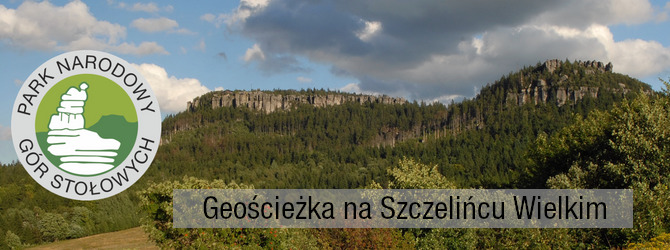
 |
GOETHE NA SZCZELIŃCU |
Góry Stołowe - kraina zrodzona z morza, miliony lat temu… To jedno z najpiękniejszych i najatrakcyjniejszych pasm górskich w Polsce, miejsce wyjątkowe ze względu na swoje ukształtowanie terenu, przepiękne formacje skalne, unikalne skalne miasta, labirynty oraz osobliwe formy zwane skalnymi grzybami. Wybitne walory przyrodnicze i krajobrazowe sprawiły, że w 1993 roku ustanowiono tu Park Narodowy Gór Stołowych.
Szczeliniec Wielki to przyrodniczy i turystyczny fenomen. Widoczna z daleka potężna platforma grzbietu tej góry, urzeka skalnym miastem, zabytkowym schroniskiem, ale przede wszystkim fantastycznymi formami skalnymi i panoramami. Ze Szczelińca we wszystkie strony świata rozpościerają się niezapomniane widoki na góry i doliny Sudetów. To miejsce unikalne – zwiedzaj, ciesz się górami, zbieraj kesze; ale nie niszcz, nie śmieć - zachowajmy to piękno dla następnych pokoleń.
|
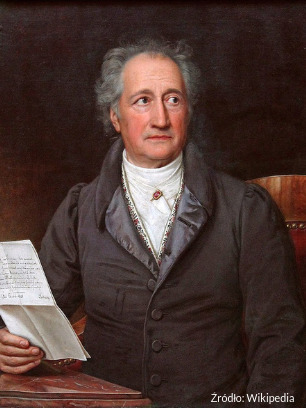
|
|
Heuscheuer, 28 sierpnia 1790
Najukochańsza,
Nie mogąc być u boku jedynej mej miłości, odchodzę. Wszak jestem tylko podróżnym, pielgrzymem na tej ziemi, Tęskniąc dotarłem dziś z wieczora do góry ze skałami, Którą Polacy Szczelińcem zowią, Jestem tu aby się dziwić. O Pani, wszakże żaden widok tego świata nie zastąpi widoku Twych oczu. Uśmiech Twój, jedno słówko, więcej mnie zachwyca, Niż cała ziemskiej mądrości skarbnica. Błagam aniele, zdejmij urok by dusza ma zaznała ukojenia. Będąc bez Ciebie umieram z rozpaczy, Cała żywotna siła moja zatonęła w targanej niepokojem bezczynności. Pani przybądź, ja tymczasem oddam mój umysł cierpieniu, I choć żadna rozrywka nie ukoi tęsknoty, przenikam tajemnicę cachingu, Któremu oddaje się ludność tubylcza. Wszak gdy zmądrzeć chcesz, przez błądzeń brnij udrękę, Gdy chcesz się stać, na własną stań się rękę! By tylko bawić się, jestem za stary, Zbyt młody, by nie odczuwać pragnienia. To co wiem, posiąść może każdy, Ślad mej rozterki pozostawiam w skrzyni, Do której miłość i rozum zawiedzie. Kto puzzle złapał, niech puzzle trzyma! Niechaj z nich użytek właściwy zrobi, Serc do serca nie dostroi, zaś klocek ku klockowi równo dopasuje, Liczba drogę Ci otworzy i wnet skarb mój odkryjesz. Największe w życiu szczęście i pożytek wielki, Umysł niezmącony, lekki.
Bądź zdrowa,
G
|
|
Przed kilkoma tygodniami pracownicy schroniska "Na Szczelińcu" natknęli się na nietypowy problem. Otóż powszechnie wiadomym jest, że znany niemiecki poeta Johann Wolfgang von Goethe przebywał w 1790 roku na ziemi kłodzkiej i odwiedził wówczas Szczeliniec. Jednak mało kto zna szczegóły tej wizyty. Poeta wielokrotnie stawał na szczycie, spędzając godziny na leczeniu cierpiącej duszy, zaś na koniec swojego pobytu, tłumacząc coś w niezrozumiały sposób, zostawił swoją walizkę.
Ponieważ nikt nie mógł zrozumieć padających wtedy słów: "kesch" i "kesching", zamknięta na kłódkę walizka spoczęła na strychu. Przypadkowo natknął się na nią pracownik schroniska szukający zaginionej kotki Księżniczki. Próbując wyjaśnić pochodzenie walizki pracownicy schroniska dotarli do najstarszych mieszkańców Karłowa, którzy pamiętają szalonego poetę, kiedy majaczył o skarbach i puzzlach. Menadżerka schroniska postanowiła pozostawić walizkę tam, gdzie życzyłby sobie poeta. Walizka nadal czeka na otwarcie, może właśnie Ty zrozumiesz wizjonerskiego poetę?
|
|
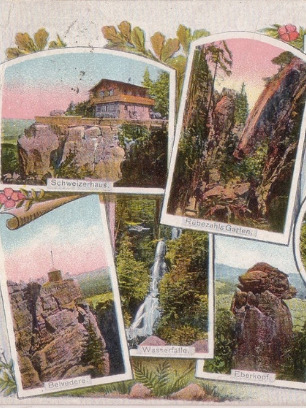
|
O keszu:
1) zbierz potrzebne informacje:
A = w którym roku na Szczelińcu był Goethe?
B = w którym roku założono Park Narodowy Gór Stołowych?
C = wysokość Szczelińca Wielkiego (oficjalna)
2) podstaw do formuły i udaj się na współrzędne finału:
N 50° 29.(A+B)-4C +11
E 16° 20.(B-2C)+205
3) a teraz śmiało udaj się na kordy finału. Wejdź do środka i odnajdź walizkę Goethego! Poszukaj też woreczka moro, gdzie znajdziesz puzzle, które dadzą Ci kod do kłódki. Koniecznie przeczytaj instrukcję, jak wpisać się do logbooka!!! Na zakończenie wszystko spakuj tak, jak było i odłóż kesza na miejsce.
Działaj rozważnie, by nie narażać się na niebezpieczeństwo. Przy rozwiązywaniu zadania i podejmowaniu kesza NIE MA konieczności wchodzenia na skały, ani wspinania się na cokolwiek!
Na obszarze Parku Narodowego ochronie podlega całość przyrody, swoiste cechy krajobrazu oraz obiekty dziedzictwa narodowego. Zadaniem Parku Narodowego jest nie tylko ochrona tego szczególnego krajobrazu, ale również udostępnianie go dla zwiedzających. Jednak pamiętaj o pewnych zasadach:

 |
GOETHE VISITS SZCZELINIEC SHELTER |
Góry Stołowe (the Table Mountains) - a land born of the sea, millions of years ago... It is one of the most beautiful and attractive mountain ranges in Poland, a unique place due to its terrain, beautiful rock formations, unique “rock cities”, labyrinths and peculiar forms called rock fungi. Outstanding natural and landscape values are reasons that the National Park of the Table Mountains has been established here in 1993.
Szczeliniec Wielki is a natural and tourist phenomenon. Visible from afar, a powerful platform of the mountain ridge, it charms with a “rocky city”, a historic mountain shelter, but above all with fantastic rock formations and panoramas. From Szczeliniec there are unforgettable views of the mountains and valleys of the Sudetes, around the world. This is a unique place - visit, enjoy the mountains, collect caches; but do not destroy, do not litter - let's preserve this beauty for the next generations.
|
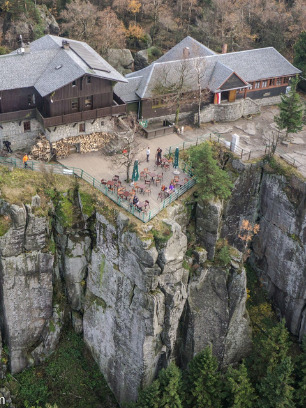
|
|
Heuscheuer, 28 August 1790
My beloved one,
Since the Fates parted me from my one true love – I am leaving. I am but a wanderer, a pilgrim upon this Earth. Filled with longing, at the close of the day I ascended a rocky and cavernous summit that the locals call Szczeliniec. I came here to wonder. The World is all before me, but compared to Thy eyes it all comes to nothing. One Smile of yours, one Word, mean more to me than all the Treasures of the World. I pray Thee, gentle Angel, free me from Thy charm, let my Soul in peace. Deprived of your Presence I am dying of despair. My whole vital force sank into anxious idleness. Oh, that Thou wert but with me! Meanwhile I surrender my Mind to suffering. Though no entertainment can comfort my longing, I delve in to the mystery of Caching, an amusement in which local people seem to indulge. By seeking and blundering we learn, all you can become on your own you earn!
I’m too old for idle play, but too young not to yearn. What I have learned anyone can possess. Who grasped the puzzle, let him keep it. Use it well! Heart to a Heart will not flock, but pieces together shall interlock! The number will open the way, and soon you will discover my Treasure. The greatest joy one in life can find is clear as crystal and unburdened mind.
Fare Thee well...
G
|
|
A few weeks ago the staff of the mountain lodge at Szczeliniec hit an unusual problem. It is a well known fact that in 1790 the great German poet Johann Wolfgang von Goethe travelled to Kłodzko and visited Szczeliniec Wielki. Only few people know the details of this visit. The poet had a habit of ascending the summit, gazing broodingly into the distance, spending hours calming his tormented soul. At the end of his stay he left his suitcase, with some incomprehensible explanations. Because nobody at the time could understand the words “kesch”, “kesching”, the suitcase was left in a darkest corner of the gloomy attic to gather dust. It was accidentally stumbled upon by a lodge worker looking for a missing cat Pincess. Trying to explain the origin of the suitcase, the shelter staff reached the oldest inhabitants of Karłów, who remember the crazy poet who loomed about treasures and puzzles. Shelter manager decided to leave the suitcase where the writer wished. The suitcase is still waiting to be opened, maybe you are the one who will understand the visionary bard?
|
|

|
About the cache:
1) collect some information to calculate the final cords:
A = in what year was Goethe visiting Szczeliniec Wielki?
B = when was Stołowe Mountains National Park founded? – year
C = official Elevation of Szczeliniec Wielki in meters above sea level
2) now use the formulas and calculate the final location:
N 50° 29.(A+B)-4C+11
E 16° 20.(B-2C)+205
3) go inside and find the Goethe's suitcase. To open it you need to have a code. Look around to find camo bags. Take the jigsaw puzzle from the bag, solve it. Please read the instructions for entering to logbook! Finally, pack everything the same way and put it in its place.
Be careful to avoid putting yourself in danger. When solving the task and looking for the cache, there is NO need to climb rocks!
The all of nature, specific landscape features and national heritage objects are protected in the area of the National Park. The task of the National Park is not only to protect this particular landscape, but also to make it available for visitors. However, you neet to remember about certain rules:

|
- Walking on the tourist trail is the safest for you and for nature ... do not go beyond the trail. The trail has the most beautiful views. Do not take shortcuts.
- Inhale the fresh mountain air, do not smoke.
- The rocks around you are not good climbing material, let go of them. There is no cache there.
- Stones and minerals lie here for millions of years ... leave them for the next generations. Do not collect and mine rocks and minerals.
- If you're are here with your dog, your friend will be safer on a leash.
|
|
- Nature lives in symbiosis - do not destroy and do not collect plants, fruit or undergrowth.
- Animals live here in the wild, it's their home. Respect their calmness, do not frigten them, do not seize the animals, do not feed them.
- Enjoy the silence and the sounds of the nature - keep quiet, do not shout, do not sing, do not use radio receivers, do not play music. Let others enjoy the mountains, do not disturb the rest of the people.
- Whatever you brought – take it with you. Take away rubbish with you and leave in designated places near the shelter or entrances to the trail.
|
 |
GOETHE NA HEJSOVINE |
Stolowe Hory - země, která se narodila z moře před miliony let... Je to jedno z nejkrásnějších a nejatraktivnějších pohoří v Polsku, jedinečné místo díky terénu, nádherné skalní útvary, unikátní skalní města, labyrinty a zvláštní formy nazvané Skalni Houby. Vynikající přírodní a krajinné hodnoty způsobily, že v roce 1993 zde vznikl Národní Park Stolovych Hor.
Szczeliniec Wielki (Velká Hejšovina) je přírodní a turistický jev. Viditelný z dálky, masivní platforma horského hřebene, okozluji skalním městem, historickým hostelem, ale především fantastickými skalními útvary a panoramatickými vyhlidkami. Z vrcholu hory se rozprostírají nezapomenutelné pohledy na hory a údolí sudetů, po celém území. Jedná se o jedinečné místo - návštěvujte, užívájte hory, sběrajte cache; ale nezničte, nehazujte odpadky - zachovejte tuto krásu pro příští generace.
|
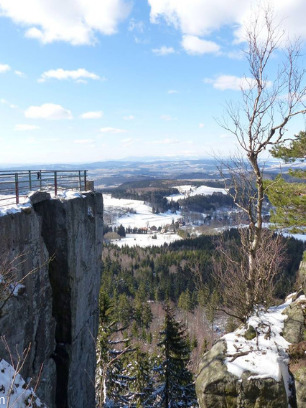
|
|
Heuscheuer, 28 August 1790
Moje nejdražší srdce,
Od té doby, co mě osud rozdělil z mé pravé lásky - odcházím. Jsem jen poutník, poutník na této Zemi. Vyplněný touhou, na konci dne jsem vystoupil na skalnatý a kavernózní vrchol, který místní obyvatelé nazývají Szczeliniec. Přišel jsem sem, abych se zajímal. Svět je před mnou, ale ve srovnání s Tvými očimi to všechno zanikne. Váš jeden úsměv, jedno Slovo, znamená pro mě více než všechny Poklady světa. Prosím tě, jemný Anděle, osvoboď mě od svého kouzla, nech mě duši v klidu. Ztratil jsem svou přítomnost, umírám ze zoufalství. Celá moje životní síla se ponořila do úzkosti. Přeji si, abys byla se mnou! Ačkoli žádná zábava nemůže potěšit mou touhu, ponořím se do tajemství Cachingu, pobavení, které místní obyvatelé mají rádi. Hledáním a chybou se učíme. Jsem příliš starý na hloupé hry, ale příliš mladý, abych byl bez touhy. To, co jsem se naučil, může mít někdo. Kdo uchopil hádanku, odhali tajemství. Využijte to dobře! Dvě srdce se nesplní, ale kusy dohromady do sebe musejí přesně zapadat! Číslo vám otevře cestu a brzy objevíte můj poklad. Největší radost v životě je jasná jako křišťál a nezatížená mysl.
Sbohem, lásko...
G
|
|
Před několika týdny se zaměstnanci turistické chaty na Hejšovině setkali s neobvyklým problémem. Je dobře známo, že v roce 1790 cestoval velkı německý básník Johann Wolfgang von Goethe do Kladskeho Pomezi a navštívil Velkou Hejšovinu. Jen málo lidí zná detaily této návštěvy. Básník měl zvyk vystoupat na vrchol, díval se rozhořčeně do dálky, trávící hodiny uklidňující trýznivou duši. Na konci svého pobytu opustil kufr, s nějakými nepochopitelnými vysvětleními. Protože nikdo v té době nerozuměl slovům "kesch", "kesching", kufr zůstal v nejtmavším rohu ponurého, pokrytého prachem podkroví. Náhodou ho našel pracovník, který hledal kočku Pincess. Zaměstnanci turistické chaty se pokusili vysvětlit původ kufru a dostali se k nejstarším obyvatelům Karlova, kteří si pamatují bláznivého básníka, který hovořil o pokladech a hádankách. Správce chaty se rozhodl nechat kufr, kam si spisovatel přeje. Kufr stále čeká na otevření, možná jste ten, kdo porozumí vizionářskému bardovi?
|
|
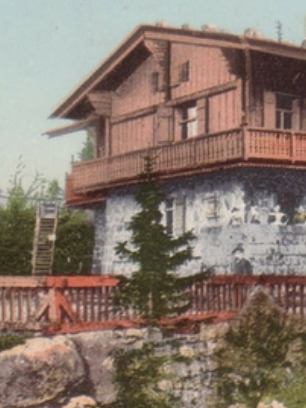
|
O kešce:
1) potřebujete získat informace:
A = rok, kdy Goethe navštívil Hejšovinu
B = rok založení Národního Parku
C = výška hory (oficiální)
2) nyni použijte vzorce a vypočítejte konečné umístění:
N 50° 29.(A+B)-4C+11
E 16° 20.(B-2C)+205
3) pokud spravne vylustite souradnice, jdete po finalku! Hledejte uvnitř kufr Goethego! Hledejte tašky v camo barvách. Vezměte puzzle ze sáčku, složíte je přímo na místě uvnitř chaty (vyjít venku je špatný nápad). Po dešifrování kódu visacího zámku můžete bezpečně stáhnout kufr a zjistit tajemství Goethego. Nakonec prosim, vracejte schranku a maskování na puvodni misto.
Buďte opatrní, abyste pri odlovu nemuseli vylézt na kameny nebo lézt na cokoliv! Počínajte si nenápadně, abychom nebudili zbytečnou pozornost.
V oblasti Národního Parku celá příroda, specifické krajinné prvky a objekty národního dědictví jsou chráněny. Úkolem Národního parku je nejen chránit tuto krajinu, ale také ji zpřístupnit návštěvníkům. Nezapomeňte však na některé pravidla:

|
- Cestování po turistické stezce je nejbezpečnější pro vás a pro přírodu ... Nenechávejte označenou stezku. Z turisticke cesty jsou nejkrásnější pohledy.
- Dejte si čerstvý horský vzduch, nekuřte.
- Skály kolem vás nejsou dobrým místem k lezení, nechodíte na ně. Není zde žádná keška
- Kameny a minerály leží zde milióny let ... nechávají je pro příští generace. Nesbírejte skály a minerály.
- Pokud jdete se svým psem, váš přítel bude bezpečnější na vodítku.
|
|
- Příroda žije v symbióze - nezničte a nesbírajte rostliny, ovoce ani podrost.
- Zvířata žijí tady ve volné přírodě, je to jejich domov. Respektujte jejich klid, nebojte se, nezachycujte zvířata a ne krmte.
- Užijte si ticho a zvuky přírody - udržujte klid, neříkejte, nepějte, nepoužívejte rádiové přijímače. Nechte ostatní užívat naše hory, nerušíte klid ostatních turistů.
- Co jste přinesli - vezměte si s sebou. Odveďte s sebou odpadky a nechte na určených místech v blízkosti turisticke chaty nebo vjezdu do stezky.
|
 |
GOETHE AUF DER HEUSCHEUER |
Die Góry Stołowe (= „Tafelberge”, dt. Heuscheuergebirge) – vor Millionen von Jahren vom Meer geformt, gehören sie zu den schönsten und attraktivsten Gebirgszügen Polens. Sie besitzen eine Vielzahl einzigartiger Felsformationen, Felsenstädte, Labyrinthe und Pilzfelsen. Kein Wunder also, dass sie seit 1993 als Nationalpark (poln. Park Narodowy Gór Stołowych) unter besonderem Schutz stehen.
Der Szczeliniec Wielki (dt. Große Heuscheuer) ist ein Naturphänomen. Der von weitem sichtbare gewaltige Tafelberg verzaubert durch ein Felsenlabyrinth, eine historische Schutzhütte, vor allem aber durch phantastische Felsformationen und Panoramen. Von hier hat man einen unvergleichlichen Ausblick auf die Berge und Täler der Sudeten, und das in alle Himmelsrichtungen. Besucht diesen einzigartigen Ort, freut Euch an den Bergen, sammelt dabei ein paar Caches; hinterlasst aber bitte nichts zerstört oder vermüllt – bewahren wir das Schöne für kommende Generationen.
|

|
|
Heuscheuer, 28. August 1790
Liebste,
da ich nicht an deiner Seite sein kann, muss ich gehen. Ich bin nur ein Reisender, ein Pilger auf dieser Erde. Die Sehnsucht trieb mich heute abend auf den Felsenberg, den man Große Heuscheuer nennt. Ich bin hier um zu staunen. Doch lässt kein Anblick dieser Welt sich vergleichen mit dem Anblick Deiner Augen. Ein Lächeln und ein Wort von Dir begeistern mich mehr, als alle irdischen Weisheiten und Reichtümer. Mein Engel, ich bitte dich: nimm den Bann von mir, tröste meine Seele. Ohne Dich zu sein lässt mich aus Verzweiflung sterben. Meine ganze Lebenskraft versinkt, während die Unruhe mich zerreißt. So richte ich dann meine Gedanken auf das Leid, und wenn auch kein Vergnügen meine Sehnsucht lindert, widme ich mich doch dem Geheimnis des Cachens, ganz so, wie es die Einheimischen hier tun. Über eigenes Irren führt der Weg zur Weisheit. Zum reinen Vergnügen bin ich zu alt, zu jung hingegen, um nicht zu dürsten. Was ich weiß, kann ein jeder sich aneignen. Die Spuren meiner Zerrissenheit lasse ich im Kasten, wohin Liebe und Verstand dich geleiten. Wer das Puzzle findet, soll richtigen Gebrauch davon machen. Nicht Herz an Herz, sondern Teil an Teil hinzugefügt ergibt die Zahl, die den Weg bereitet, meinen Schatz zu entdecken. Das größte Glück im Leben und von größtem Wert ist ungetrübter, unbeschwerter Verstand.
Bleib gesund,
G
|
|
Vor ein paar Wochen wandten sich Mitarbeiter der Berghütte auf dem Szczeliniec Wielki auf ein ungewöhnliches Problem. Es ist allgemein bekannt, dass Johann Wolfgang von Goethe im Jahr 1790 den Glatzer Kessel und auch die Große Heuscheuer besucht hat. Kaum jemand kennt jedoch Details dieses Besuchs. Der Dichter stand mehrfach auf dem Gipfel des Berges und verbrachte Stunden damit, seine leidende Seele zu kurieren. Am Ende seines inspirierenden Besuches ersann er völlig neue, unbekannte Wörter und ließ seinen Koffer hier zurück. Dieser mit einem Vorhängeschloss versehene Koffer verstaubte, da niemand damals die Worte "Kesch" oder "Kesching" kannte, auf dem Dachboden und geriet schließlich in Vergessenheit... Durch Zufall fand ihn ein Mitarbeiter der Berghütte, der gerade sein entlaufenes Kätzchen suchte. Die ältesten Einwohner von Karłów erinnern sich an Erzählungen, nach denen der Dichter von Schätzen und Rätseln gefaselt haben sol. Der Leiter der Berghütte beschloss den Koffer gemäß Goethes Wunsch auszustellen. Er wartet immer noch darauf, geöffnet zu werden. Vielleicht versteht Ihr ja die Gedanken des visionären Dichters?
|
|
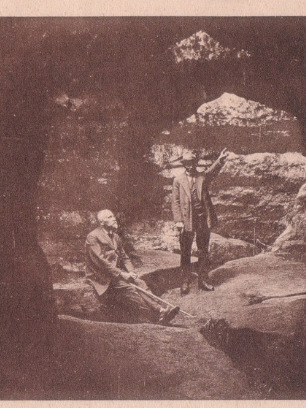
|
Der Cache:
1) sammeln Sie die Informationen, die Sie benötigen:
A = in welchem Jahr war Goethe in Szczeliniec?
B = in diesem Jahr wurde der Stołowe Mountains National Park gegründet?
C = Höhe von Szczeliniec Wielki (offizielle)
2) Die Grundlage für die Formel und gehen Sie zu den Strängen des Finales:
N 50° 29.(A+B)-4C+11
E 16° 20.(B-2C)+205
3) Findet auf dem Herbergsgelände Goethes Koffer! Wie findet man den Code? Ein Kinderspiel! Setzt das Puzzle zusammen, das sich direkt hinter der Eingangstür befindet. Wenn ihr die Herberge an der Bar betretet, findet ihr ein Säckchen in Tarnfarben. Nehmt das Puzzle aus dem Säckchen und setzt es in der Herberge zusammen (es ist keine gute Idee, damit nach draußen zu gehen). Nachdem ihr den Code zum Vorhängeschloss gefunden habt, könnt ihr Goethes Geheimnis kennenlernen. Zum Schluss legt den Cache bitte genau wieder so zurück, wie Ihr ihn gefunden habt.
Handelt verantwortlich und begebt Euch nicht in Gefahr! Beim Lösen der Aufgabe und der Suche nach dem Cache ist es NICHT nötig, auf Felsen zu klettern!
Auf dem Gebiet des Nationalparks sind Natur, Landschaft und Objekte nationalen Erbes in ihrer Gesamtheit geschützt. Zu den Aufgaben des Nationalparks gehört dem Schutz der Landschaft auch deren Bereitstellung für Besucher. Beachtet dabei bitte einige Regeln:

|
- Das Wandern auf markierten Wegen ist am besten für Euch und die Natur... verlasst sie deshalb nicht. Vom Weg aus hat man die schönsten Ausblicke.
- Atmet die frische Bergluft ein, raucht nicht.
- Die Felsen ringsum sind kein geeigneter Platz zum Klettern. Verzichtet also darauf, Caches findet Ihr dort keine.
- Steine und Mineralien liegen hier seit Jahrmillionen... nehmt sie bitte nicht mit, sondern lasst sie für die kommenden Generationen liegen.
- Cachen mit Hund? Klar, aber am besten an der Leine.
|
|
- Die Natur lebt in Symbiose – zerstört / pflückt keine Pflanzen, Früchte oder Bodendecker.
- Die Tiere leben hier in Freiheit, in ihrem Zuhause. Lasst ihnen Ihre Ruhe, scheucht sie nicht auf, fangt und füttert sie nicht.
- Genießt die Ruhe und die Stimmen der Natur – verhaltet Euch ruhig, schreit oder singt nicht und benutzt keine Radios oder ähnliches. Respektiert auch die Ruhe der anderen Besucher.
- Nehmt mit, was Ihr mitgebracht habt. Werft Euren Müll in die dafür vorgesehenen Behälter an der Schutzhütte oder am Beginn des Wanderwegs.
|